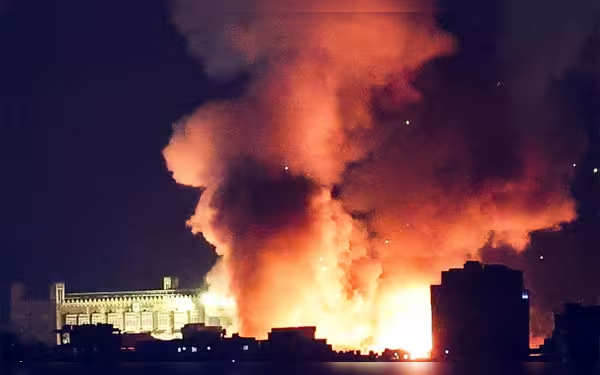Saturday, November 16, 2024 05:51 PM
Health Workers Under Siege in Lebanon Amid Escalating Israeli Attacks
- Seven paramedics killed in Israeli airstrike near hospital.
- Lebanon's health minister condemns attacks as war crimes.
- Over 100 health workers have died since conflict escalated.
 Image Credits: arabnewspk
Image Credits: arabnewspkHealth workers in Lebanon face deadly Israeli attacks, with over 100 fatalities reported amid escalating violence.
In recent weeks, the ongoing conflict between Israel and Hezbollah has escalated dramatically, leading to devastating consequences for health workers in Lebanon. The situation has become increasingly dire, with reports indicating that numerous medical professionals have lost their lives due to military strikes. The latest incident occurred on Friday when Israeli forces launched an airstrike near a hospital in southern Lebanon, resulting in the tragic deaths of seven paramedics. This attack has raised serious concerns about the safety of health workers in the region, as they continue to provide critical care amidst the chaos.
The Marjayoun hospital, located in southern Lebanon, was struck without warning, causing significant damage and forcing the facility to close its doors. Hospital director Mounes Kalakesh reported that the airstrikes not only shattered glass and flung doors off their hinges but also instilled fear and panic among the medical staff. "We have not been able to work. There was fear and panic among the staff," Kalakesh stated, highlighting the challenges faced by health workers in such a volatile environment.
Despite the escalating violence, the hospital had not received any wounded patients for days prior to the attack, as ambulance crews were hesitant to operate in the area. Kalakesh emphasized that the government hospital did not receive any warnings from Israeli forces, even though nearby villages had been advised to evacuate. This lack of communication has left health workers feeling vulnerable and unprotected.
In response to the attack, Israel's military spokesperson accused Hezbollah of using ambulances to transport weapons and fighters, a claim that Lebanese officials and hospital directors vehemently deny. Lebanon's health minister has condemned these actions, labeling them as a "war crime" against medical teams and paramedics. The health ministry reported that over 100 health workers have been killed since the conflict intensified, further complicating the already strained healthcare system.
The Islamic Health Committee, which coordinates health responses during crises, has also expressed grave concerns for the safety of its members. Reports indicate that rescue teams have come under fire while clearly identified and operating in areas where they were assisting the wounded or extinguishing fires. The situation has become increasingly perilous, with Kalakesh describing the harrowing scene of paramedics dying in their vehicles.
As the conflict continues, the impact on the healthcare sector is profound. The Lebanese health ministry has reported damage to nine hospitals and 45 healthcare centers, severely undermining the public's access to medical care. The recent shelling of Salah Ghandour Hospital in Bint Jbeil, which resulted in injuries to nine medical staff members, further illustrates the dangers faced by healthcare providers in the region.
The ongoing violence in Lebanon poses a significant threat to health workers who are dedicated to saving lives. The tragic loss of paramedics and the targeting of medical facilities not only endangers those on the front lines but also jeopardizes the health and safety of the entire population. As the situation unfolds, it is crucial for the international community to advocate for the protection of healthcare workers and ensure that they can operate safely, providing essential care to those in need.













